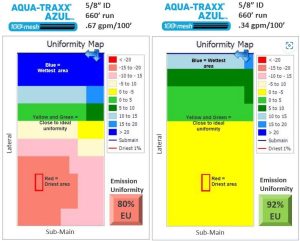Source: Western Farm Press
“In an era of diminishing natural and human resources and growing regulatory and marketplace demands, the future of agriculture depends on technology,” says Tom Nassif, president and chief executive officer for Western Growers Association (WGA), which is working to connect high technology and the soil through a facility based in America’s salad bowl.
The new Western Growers Center for Innovation and Technology (WGCIT), which opened late last year at Salinas, Calif., is a technology incubator aimed at bringing innovative entrepreneurs together with farmers to facilitate creative solutions to the biggest challenges facing agriculture.

It’s hoped the outcome of this connection between high technology and farmers will boost the ability to feed more people with fewer inputs, while leaving smaller footprints in the soil.
Founded in 1926, Western Growers Association is a trade organization representing California, Arizona, and Colorado farmers who grow, pack, and ship nearly half of the nation’s produce.
Complicated Issues
Several years ago, board members began formulating the idea for the center as they continued to work through a host of complicated issues surrounding the lack of water, a diminishing labor force, and other challenges facing growers and processors.
Hank Giclas, WGA senior vice president for science, technology, and strategic planning, says the goal behind the center is to connect growers with start-up companies and find practical solutions to the challenges facing agriculture.
The center encompasses 2,800 square feet of business space in the heart of California’s salad and vegetable production and processing region. It was located there, in large part, because those who were fundamentally interested in such an idea live and work in the region. It fits into a larger dream of business leaders in Salinas to link the technological advancements of the Silicon Valley some 75 miles north with the cornucopia of produce grown in the Salinas Valley.
Linking Sectors
It fits into a larger dream of business leaders in Salinas to link the technological advancements of the Silicon Valley some 75 miles north with the cornucopia of produce grown in the Salinas Valley.
Several large, corporate sponsors have already stepped up to assist with the incubator, including Toro, Taylor Farms, JV Smith Companies, Observant, Duncan Family Farms, Bank of America/Merrill Lynch, Prophet, Monsanto, Farm Credit and Bayer.
Bruce Taylor, chairman and CEO of Taylor Farms, was instrumental in coalescing the Western Growers board of directors around his vision of helping agriculture facilitate solutions to its resources challenges.
“The fresh produce industry is labor intensive and requires significant use of water and other inputs,” Taylor says. “If we are going to continue providing safe and healthy food to a growing population, we must collaborate more closely with the innovators and entrepreneurs who can help us revolutionize how we farm.”
The center will help identify and prioritize the major needs facing the agriculture industry, provide support to start-up companies as they develop and refine technologies to address those priorities, and communicate the most promising advancements to the industry and venture capitalists.
The idea behind the center, says Hank Giclas, is to accelerate technological development and commercial availability through closer relationships and introductions that WGA can facilitate between those in the high tech world and those in commercial agriculture. Through these introductions, he hopes to foster communications that can inform growers of potential solutions for their issues, and inventors about the challenges faced by commercial agriculture.
“Because Western Growers is dealing with some of these complicated issues, such as water quality, lack of water, lack of labor, etc., we have always had an eye out for startups, entrepreneurs, and technologies that would help us in those areas,” Giclas says.
Industry-Wide Goal
The center and its ideas are not aimed merely at the grower or specifically toward the processor, but rather as a means to serve the entire industry.
Several companies are already on board with the center, utilizing space in the Taylor Building in downtown Salinas and taking advantage of the connections provided by Western Growers to meet with those in agriculture to develop ideas that could become the next big things for farming.
All WGCIT startup companies have access to hot desks or work stations, each with the amenities of a traditional office. Additionally, tenants will have access to regular programming — classes, workshops and networking events — designed to provide them with the business knowledge and customer relationships needed to successfully bring their technologies to market.

Rao Mandava, chairman and president of Inteligistics, a company that uses the Internet of Things and Big Data to offer innovative temperature sensor software for the supply chain, is pleased to be one of the center’s inaugural tenants. “We’re excited at the opportunity to showcase our solutions and connect with like-minded entrepreneurs in a fast-paced environment,” he says.
Brian Dawson is chief executive office of Harvest Port, a company that looks to connect growers and processors with equipment and other capital needs in a somewhat different manner than the typical rental process used for farm equipment.
Utilizing Idle Assets
More than an equipment rental idea, he says, the idea is to connect those who have assets sitting in a yard unused for periods of time with those who could use it during that downtime.
“Most of these big organizations have millions of dollars in capital sitting in yards that they’re only using two, three, four months of the year,” Dawson says. He likens it to a farmer friend borrowing equipment from another farmer friend at a price advantageous to both.
The idea is for a website where those in need of certain equipment could go online and search in their area for what they might need — harvest trailers, bins, forklifts, cold storage space, you name it.
While labor and water issues command much attention these days, Giclas points to a growing issue: what to do with agricultural waste. “How do we manage waste from grocery stores or processing facilities?” he asks.
Daniel Morash is founder of California Safe Soil, a Sacramento-based company with a patent-pending composting process that collects culled organic waste and processes it into fertilizer that can be applied through drip irrigation. “The typical supermarket throws away 500 pounds of food each day,” he says. “A lot of that is produce, meat, fish, and dairy products.”
Other resident companies in the WGCIT include:
- HeavyConnect — A company that provides growers with tools to automate and simplify many of the tasks that consume a farming manager’s day.
- GeoVisual Analytics — An early warning and monitoring system platform to help improve crop yields and reduce losses by detecting problems in the field earlier and with more precision.
- iFood Decision Sciences — a company that provides flexible food safety software applications for the specialty crop industry.
- Concentric Power — An innovative, clean energy infrastructure company dedicated to sustainable agriculture.
The WGCIT program offers licensing opportunities to startups looking for assistance and a helping hand in connecting with agricultural processors and growers.
Information on the facility and how to become involved with the program can be found online at http://www.wginnovation.com/
Article by Todd Fitchette via Western Farm Press




